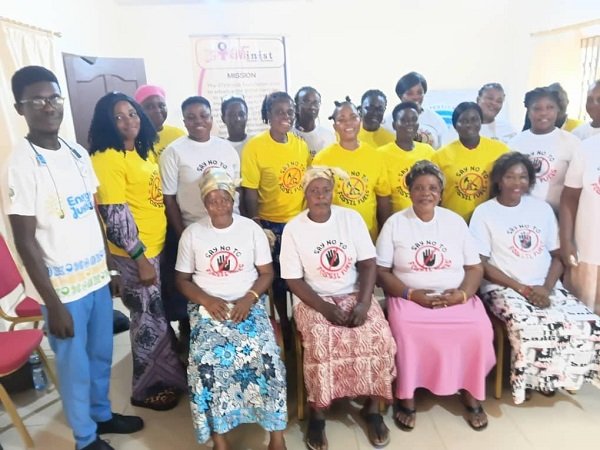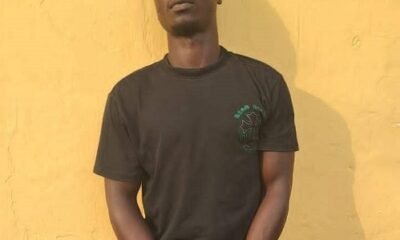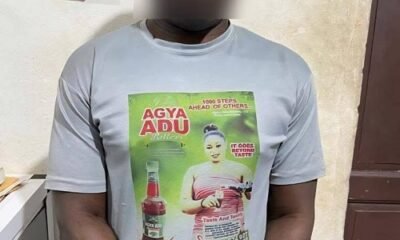Gender
Vice President Opoku-Agyemang visits five families of victims of helicopter tragedy

Vice President Professor Naana Jane Opoku-Agyemang on Tuesday led a government delegation to pay a courtesy visit on the families of the five civilian victims of the August 6 helicopter tragedy.
The visit, which was on behalf of President John Dramani Mahama, who is currently on a working visit to Japan, was to comfort the widows and children of the deceased persons, and to find out how they were doing.
The Vice President’s delegation visited the families of Dr Samuel Sarpong, Vice Chairman of the National Democratic Congress (NDC) and Mr Samuel Aboagye, Deputy Director-General, National Disaster management Organisation (NADMO).
The rest were the families of Alhaji Mohammed Muniru Limuna, Deputy National Security Coordinator in-charge of Human Security; Dr Edward Kofi Omane Boamah, Defence Minister and Alhaji Dr Ibrahim Murtala Muhammed, Minister of Environment, Science and Technology.
Members of the Vice President’s delegation included Mr Julius Debrah, Chief of Staff at the Presidency; Dr Valarie Sawyerr, a Senior Presidential Advisor for Governmental Affairs; Mr Alex Segbefia, Chief of Staff at the Office of the Vice President and Mr Seth Terkper, Economic Advisor to the President.
The rest are Nana Oye Bampoe Addo, Deputy Chief of Staff in-charge of Finance and Administration; Mr Fifi Fiavi Kwetey, General Secretary of the ruling National Democratic Congress (NDC); Hajia Shamima Muslim, Deputy Presidential Spokesperson; Nana Yaa Jantuah, a Presidential Staffer and Mr Rex Omar, Presidential Staffer.
The Limuna Family expressed gratitude to the Government for the visit, stating that the visit would go a long way to strengthen and comfort them.
Hajia Shamima Muslim, a Deputy Presidential Spokesperson, speaking to the media at the end of the visit, said President Mahama had directed that the delegation should visit each family of the deceased persons to find out how they were doing, especially the spouses and the children.
She noted that because the President was out of the jurisdiction, the Acting President, Vice President Professor Opoku-Agyemang, led the delegation to pay visitations to each one of the families of the victims of the tragedy.
She said basically, the visit was also to communicate the President’s commitment to support the families through this very difficult period and to reassure them of the pledge that he had made, especially for the families with young children, who were still in school, with the announcement of the Children’s Support Fund.
Hajia Shamima Muslim announced that a lot of donations were already coming through.
She said those who might want to also visit the Government Communication portals on how they could also donate to the Children’s Support Fund for the various victims or the families of the nation’s fallen heroes could do so.
That, she said, was also to help the Government ensure that whatever their fathers would have done for them, the Government would step in and do the same.
Touching on the adult children of the victims, Hajia Shamima Muslim said conversations were around on how to support their own aspirations; stating that it was the same commitment to them.
“So today we just came to reassure the families that the President is with them and will stand with them throughout this very difficult period,” she said.-GNA
Gender
Workshop to deepen coverage of gender-based issues held in Accra
A training and capacity-building workshop was held on Thursday for the media to intensify coverage on gender-based issues to support women’s participation in leadership and governance in Accra.
The workshop, held under the theme ‘Strengthening Advocacy for the Implementation of Ghana’s Affirmative Action (Equity) Law, 2024 – The Case of the Media’, brought together journalists from selected media houses.
The Convener of the Affirmative Action (AA) Law Coalition, Ms Sheila Minka-Premo (Esq.), stressed that the media has a critical responsibility to educate the public on the importance of the Affirmative Action Act, noting that sustained and informed reporting would strengthen advocacy and support the effective implementation of the law.
While commending both the Legislature and the Executive for the passage and presidential assent of the Affirmative Action Bill into law, the AA Law Coalition Convener appealed to government to address existing gaps. These include the constitutional provision of 30 per cent women’s representation in politics, inadequate policy frameworks to advance affirmative action, and weak compliance by state institutions.
She charged the media to highlight and promote the role of women in leadership and to actively support a smooth and effective implementation process of the Act.
In her welcome address, Executive Director of ABANTU for Development, Dr Rose Mensah-Kutin, said the training sought to strengthen journalists’ advocacy skills to enable them to educate the public on the provisions and significance of the law.
Dr Mensah-Kutin commended ActionAid Ghana for supporting the advocacy efforts, urging the media to prioritise the law to ensure its sustainability.
The Affirmative Action (Gender Equity) Act, 2024 (Act 1121) was passed by Parliament in July 2024 and received presidential assent in September 2024, following years of sustained advocacy by women’s rights organisations, gender activists, and other stakeholders.
By Linda Abrefi Wadie
Join our WhatsApp Channel now!
https://whatsapp.com/channel/0029VbBElzjInlqHhl1aTU27

Gender
STEMinist Foundation, Keta Ramsar centre train women on rights, leadership

STEMINIST Foundation, Ghana, a Non-Governmental Organisation (NGO) with support from Keta Ramsar Centre has trained about 25 women selected from the Keta Municipality on the rights of women and how to use them for their voices to be heard in their communities.
STEMinist Foundation, Ghana, is a network of women advocating equal opportunities through excellent representation of women in Science, Technology, Engineering and Mathematics (STEM).
The women, mostly fishmongers and other self-styled workers, were taken through topics such as Understanding Energy and Climate Justice, Fossil Gas Expansion, Livelihoods’ Care Work and Health, Women Leadership, and Power Building among others.
Mrs Nerissa Edem Anku, Gender Justice Transition Advisor of the Foundation, noted that the theme “Energy Justice: Empowering Women with Power, Rights and Dignity,” was chosen for the women to reconnect, reflect, and look ahead in shaping their rights as women.
She stated that women have been relegated to the background in the communities when it comes to decision making, stressing the need to correct that for them to know they have rights to fight for themselves.
Mrs Nerissa Edem Anku further noted that women in fishing communities wanted to see real and tangible improvements in their living conditions, spearheaded by government to prevent unhealthy confrontations with the local people.
She assured that the NGO would continue to strengthen its programmes to ensure that women were empowered to contribute meaningfully to the socio-economic development of their families, communities, and the nation.
Miss Portia Adu-Mensah, Facilitator, Community Mobilisation Communicator, on her part added that all stakeholders have to adopt more innovative steps to build an environment in which women can thrive. That, she said, would win the confidence of the women and promote more inclusive partnerships.
The Assemblywoman for Dzelukope, Ruby Adukpoh, on behalf of the women thanked the NGO for the gesture and reaffirmed their commitment to strengthening their collective voices and influence in shaping policies that will affect them.
From Kafui Gati, Keta
Join our WhatsApp Channel now!
https://whatsapp.com/channel/0029VbBElzjInlqHhl1aTU27















